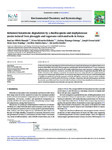Enhanced hexazinone degradation by a Bacillus species and Staphylococcus species isolated from pineapple and sugarcane cultivated soils in Kenya

View/
Date
2022Author
Muendo, Boniface Mbithi
Shikuku, Victor Odhiambo
Getenga, Zachary Moranga
Lalah, Joseph Owuor
Wandiga, Shem Oyoo
Karau, Geoffrey Muriira
Rothballer, Michael
Metadata
Show full item recordAbstract
In this work, hexazinone-degrading bacterial strains from Kenyan tropical soils with long term application history were
isolated and identified. Non-sterile soils from sugarcane and pineapple cultivated fields with over 15 years' hexazinone
application history degraded 82.2% and 93.4% initially applied hexazinone under laboratory conditions after 146
days of incubation, respectively. In contrast, non-sterile soils without history of application degraded 48.8% and
36.8% of hexazinone after 146 days, respectively. From liquid culture tests, using soils with prior application history
from sugarcane and pineapple cultivated soils, two hexazinone-degrading bacterial strains were isolated and identified
as Staphylococcus gallinarum and Bacillus toyonensis and Bacillus thuringiensis, respectively. The pure isolates rapidly degraded hexazinone up to 38.4% and 53.2% of 50 mg/L in 46 days, respectively, with microbial hexazinone metabolite
B previously reported detected. These bacterial strains from Kenyan soils have been identified for the first time as prospective hexazinone-degraders from pineapple and sugarcane-cultivated soils.
